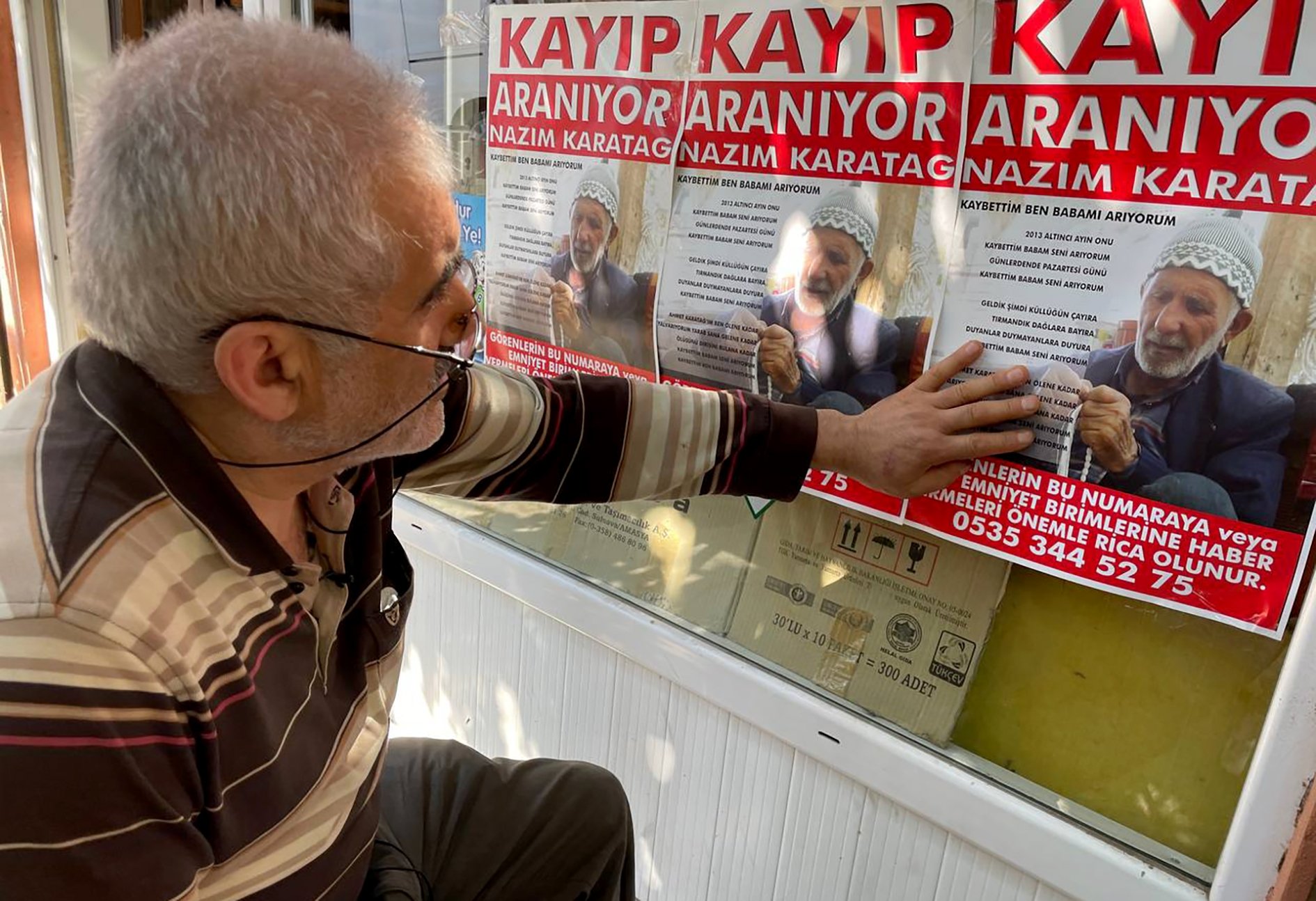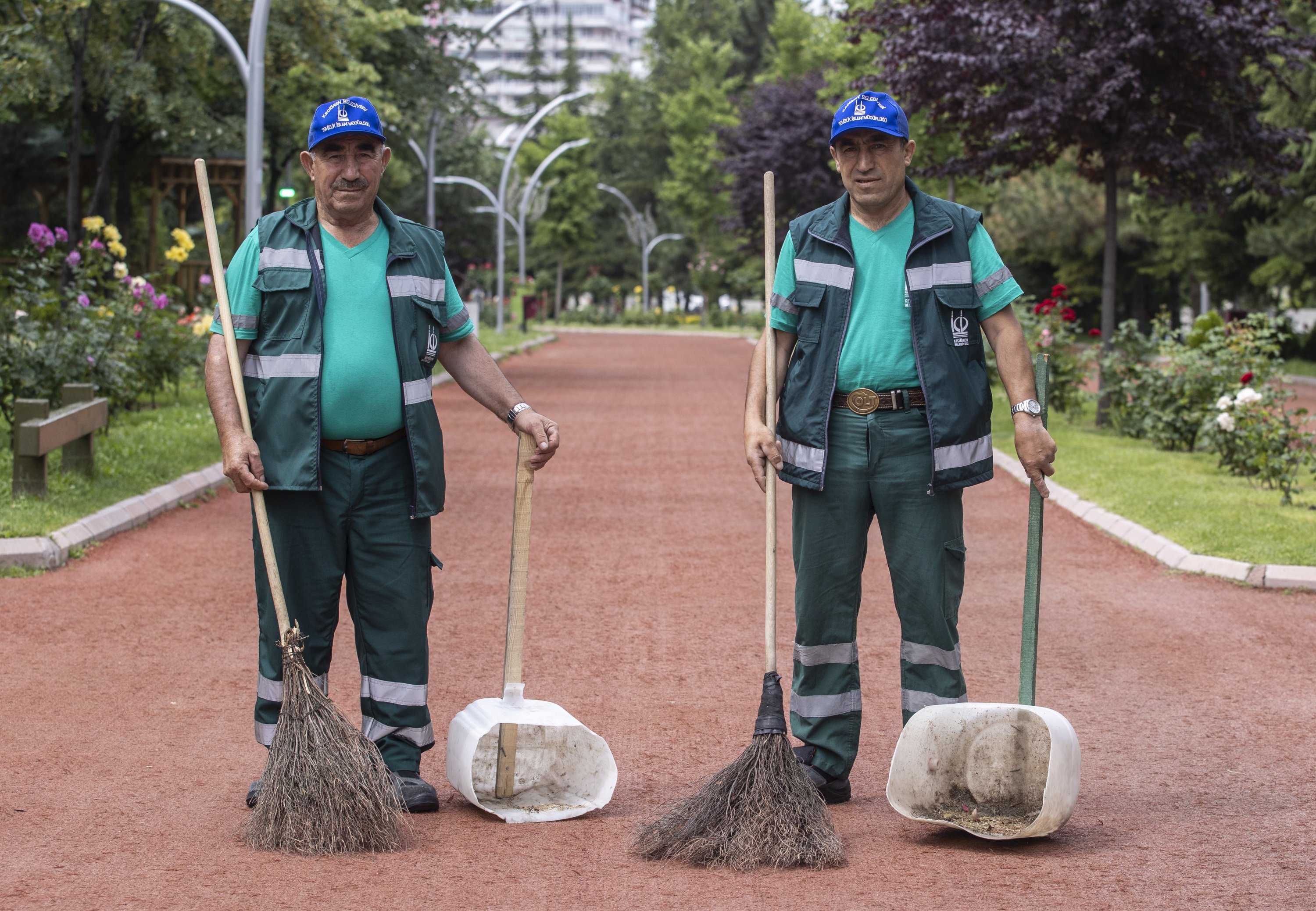© Turkuvaz Haberleşme ve Yayıncılık 2024
No matter how patriarchal Turkish society is, mothers are seemingly more revered than fathers in culture and social life. This is rightfully so for their double burden as members of households doing all the chores, while also pursuing careers, or in rural areas, helping their fathers working in the fields. Under such circumstances, stories of fathers and children’s bonds with their fathers, alive or not, are the highlight of Father’s Day marked on Sunday.
For Şefik Ayceman, Father’s Day is just an ordinary day where he attends to the needs of his family of four. The 66-years-old man living in the eastern Turkish province of Bingöl is the only carer of his three mentally-disabled children and paralyzed wife. Ayceman’s life changed in 1993 when his wife became paralyzed due to multiple illnesses, leaving the care of his children, now between the ages of 32 and 41, to him. He quit his job at a local mill and devoted all his time to the four, from hospital visits to home duties, cooking, cleaning and taking them to the hospital for treatment. Despite his old age, Ayceman is resilient and full of vigor, always with a smile on his face. “I am always at home if I am not in the hospital. My days pass by attending to my family. It has been almost 20 years but I never complained,” he told Anadolu Agency (AA) ahead of Father’s Day. “My wife can barely walk and I have to attend to all her needs. Only my elder son Ferhat can function well and he helps me at times. My children are doing fine and I tell all other parents not to complain whatever situation their children are in,” he said. “This is my fate and I accepted it and I hope all the fathers have this passion for their wives and children,” he says.
Being together with their fathers is a blessing for Ayceman’s children, but for refugee children forced to be separated from their fathers, it is another story. “I miss him very much and I want to hug him,” 8-year-old Milana Luilka said. It has been four months now for Liulka, her mother and siblings being away from their father, a Ukrainian engineer who stayed behind in his war-torn country. His wife and two children took shelter in Turkey, in the western town of Kuşadası in Aydın province, with fellow expatriates fleeing the conflict. Since they set foot in Turkey in March, they anxiously await good news from Ukraine and look forward to reuniting with their fathers. Occasional video calls are their only connection. Anatolii Liulka told Anadolu Agency (AA) that she marks her Father’s Day away from her husband and father in Ukraine. “He is world to me and I never thought I would leave him. But this was his decision, to stay and serve his country. We are always in touch but my children miss him very much,” she said.
Yuliia Siurenko also left her father and husband back in Ukraine and took refuge in Kuşadası with her 4-year-old son. “This is our first Father’s Day away from our fathers. It is very emotional. I fear I won’t see them again. I pray all the time for them. We speak on the phone but I want to touch them, to hug them. I want my son to hug his father again,” she said.
Ahmet Karatağ is ready to accept his father’s death but all he wants now is to find something belonging to him. Karatağ, who lives in Istanbul, spent years away from his father who lived in his hometown in the central province of Sivas but never thought he would disappear one day. There is no sign of the 80-year-old man who vanished nine years ago without a trace while walking home on Father’s Day. Since then, Karatağ devoted his life to finding his father, putting up “missing” signs all across the roads connecting Sivas to Istanbul.

“It is a tragedy if you are born without a father but it is another tragedy when you lose your father. My mother died recently and we buried her. I know where she is now but I am desperate to know where my father is. If only I could find something belonging to him, be it his walking cane or something else. That would comfort me a bit,” he told AA. “The father is everything to a child. I wish I could be with him on Father’s Day,” he said. Karatağ and his siblings set out on a search in all the possible places he could have gone after security forces exhausted all means to locate him. When the search proved futile, they started posting missing notices everywhere while a large poster with a “missing” note covers the window of Karatağ’s shop in Istanbul. “My father loved going everywhere on foot and would frequently visit his relatives and friends in other villages and towns. He left to visit a friend nine years ago and we did not hear from him since,” he said.
For fathers who lost their children, the day is a solemn occasion, like Ismail Kayadibi. Kayadibi’s son, Şükrü Can, was a 28-year-old police officer when he was martyred dead by terrorists in the southeastern province of Şanlıurfa in 2019. “I still become excited, thinking he returned whenever the doorbell or the phone rings,” he told the Sabah newspaper on Father’s Day. “It is like he is still working and would return from duty,” he added. Kayadibi is among thousands of “martyrs’ fathers” who lost their children in Turkey’s counterterrorism operations. “It is something to be proud of but my heart cannot bear losing him,” he said. Osman Kızılırmak, who lost his police officer son in a terrorist attack in Istanbul in 2016, said his pain is “great” and finds solace in seeing his son’s name given to the police station he worked at. “I don’t have a Father’s Day now but he will always be remembered. I am proud, just as I was proud when he became a police officer,” he said.
“He would never forget a Father’s Day and would always call or visit. Now, I visit him on Father’s Day,” Mahmut Duran, father of Yunus Emre Duran who died in a 2016 terrorist attack targeting soldiers in the central province of Kayseri. He visits Duran’s grave on every Father’s Day and hopes “no father would lose their child in such attacks.”
Pride is the common theme of Father’s Day for fathers. Metin Gazoz feels it this year more. Father of Olympics champion archer Mete Gazoz told AA that he always hoped his son would make him proud and saw it happen. “I think this is what fathers expect from their children only,” he said. A former archer himself, Metin Gazoz said he had only a few goals for his son. “I wanted him to have a good education and be happy. I wanted him to do something that would make everyone look at him proudly. While I was an archer, I always dreamed of attending the Olympics. One day, I was talking to Mete about my dream and he told me he found “a way” to achieve it. He was about 8 years old back then. ‘I know how we would do it. I’ll be in the Olympics and there will be the name of ‘M. Gazoz’ on my jersey and you will be there to watch me,’” recalling his memory with his son. Yet, the success of his son requires a strict training regimen and the father says he barely sees his son now. “We always speak on the phone and I don’t think it is important to be together as long as we have strong bonds. He has a difficult life and we have to bear with it. We are happy to see him happy and seeing him smiling after winning the tournaments makes him happy,” he said.
Another proud father is Erdoğan Demirezer, a specialist sergeant who found the rare opportunity to work with his son, in the Turkish Armed Forces (TSK). Demirezer and his son Sezer, a noncommissioned officer, take pride in serving the army at an air base in the western province of Balıkesir. “It is a good feeling. We spend almost all day together, going to picnics or swimming after work. Moreover, I am proud to serve my country together with him. I have two other sons and they aspire to be military officers. I am proud to instill this love of the country to my sons,” he told AA.

In the capital Ankara, Yunus Şimşek accompanies his son Sami every day as the two street sweepers enjoy working and earning a living together. “I am so proud and happy with him. I like this job and my son helps me at times when I am too tired. In turn, I help him,” he told AA. “I am glad that my supervisors assigned me to the same place with my father. Feeling your father’s support in your job is beautiful. Better yet, I can see my father more during the day,” Sami Şimşek said.
